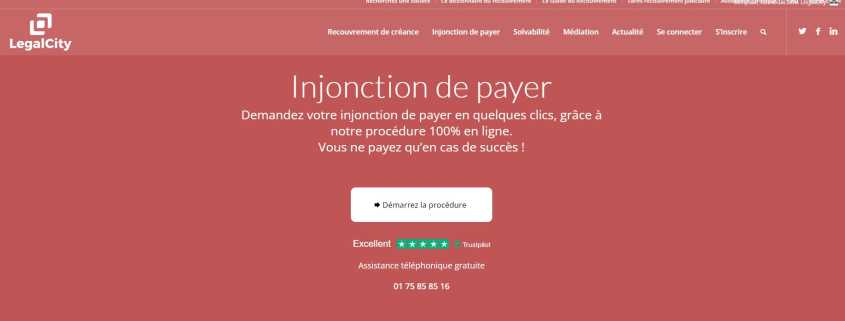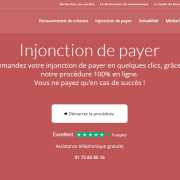A little more than a year after the reform of the injunction to pay procedure, Legalcity takes stock for you:
A little more than a year after the reform of the injunction to pay procedure,
Legalcity takes stock for you:
Theinjunction to pay allows any individual or legal entity to recover a debt or an unpaid invoice.
The procedure is intended to be quick and efficient, and the legislator's ambition was to make it simpler.
Thus, the code of civil procedure relating to the implementation of the injunction to pay procedure has been modified.
On the motion for an order to pay:
It is the Registry of the competent Court that systematically receives the request from the creditor or his agent (Legalcity) by means of a request that specifies the amount of the principal, but also a certain number of additional sums such as penalty clauses, accessory costs and requests for Article 700 in an exhaustive and detailed breakdown of the various elements of the claim
The new article 1407 of the Code of Civil Procedure specifies that the request must be accompanied by a list of supporting documents and a copy of the documents supporting the request.
Before the reform, the order issued by the Court did not show the executory formula.
Once the deadlines had been met, it was necessary to apply to the Court for the enforcement of the said order.
Article 1410 of the Code of Civil Procedure has been amended accordingly.
Service of the Enforceable Order:
After the reform of the order for payment procedure, a certified copy of the order for payment together with the list of supporting documents is sent to each debtor.
All the documents are made available in a dematerialized way by the firm.
It notifies the debtor(s) who can connect to a dedicated safe.
In the event that the Justice Commissioner is unable to do so, article 1411 of the amended Code of Civil Procedure allows him to attach all the documents with the copy of the petition when serving the enforcement order.
Thus, article 1413 of the Code of Civil Procedure confirms that the time limits for opposition and the Court before which it is filed must be clearly indicated in the notification.
The formalism of the opposition remains unchanged and the reform does not bring any change.
An important point and clarification brought by the rewording ofarticle 1422 of the Code of Civil Procedure:
"No matter how service is effected, the time limit for opposition provided for in the first paragraph of article 1416 suspends execution. An objection filed within this period is also suspensive. The order shall not constitute an enforceable title and shall not produce the effects of such a title or of a court decision until the causes of suspensory effect provided for in the first paragraph have expired. It then produces all the effects of a contradictory judgment. It may not be appealed even if it grants delays in payment.
This is indeed normal, because if the order is correctly served with the executory formula, the opposition prevails and allows to suspend the execution by the Commissioner of Justice. The order thus becomes enforceable only after the time limit for appeal has expired!
It is thus imperative to have a Certificate of No Objection from the Court in order to execute!
LEGALCITY's comments on the new injunction to pay procedure and feedback:
Since March 2022, we have noticed a deterioration in processing times by the Court Clerks' Offices, but this deterioration is not homogeneous according to the Clerks' Offices.
Where we get an order in less than 15 days, we get it in almost 4 months depending on the jurisdiction.
The reform was intended to speed up the implementation of the order for payment procedure.
First effect for the procedure:
The time saved by not asking the Court to affix the executory formula on the order is lost by the need to obtain from the same Court a CNO (Certificate of No Opposition)
The second effect is "commercial" for the Bailiffs!
Thus, before the reform, it was necessary to serve a second time the order with the executory formula! The reform now allows the first service to do so.
The Judicial Commissioners have adapted and since they cannot serve the document a second time and in order to compensate for the loss of fees that this induces, following the reform, have found a solution.
Therefore, they charge the creditor for applying for and obtaining the CNO from the Court.
Some even dare to ask for 51 Euros for a procedure that costs only 4 Euros to the clerks!
Legalcity Collection Agency offers its clients the CNO (Certificate of Non Objection)
Thus, in 2023, Legalcity is the platform that allows you to manage your order for payment procedure 100% online.
That is why you should entrust the collection of your unpaid debts to a firm rated 5 ⭐⭐⭐⭐⭐ on Trustpilot.
You benefit from the professional support of a specialized lawyer at low cost.

 Legalcity
Legalcity

 LEGALCITY
LEGALCITY

 Legalcity
Legalcity



Leave a comment
Join the discussion?Feel free to contribute!